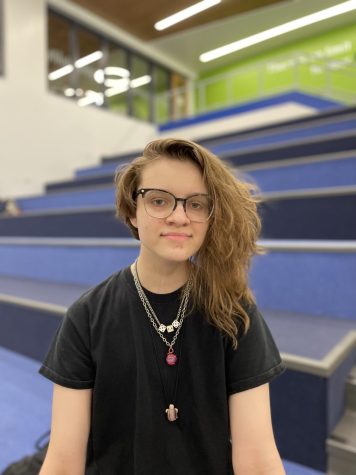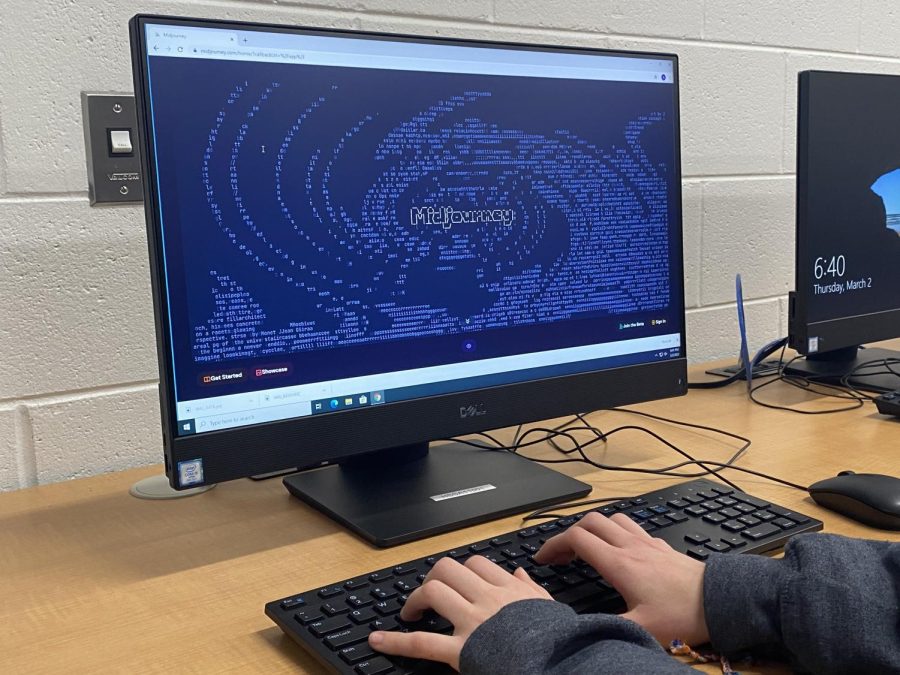Artificial implications
Students consider potential effects of AI when making future career plans
Photo by Lexy Kushner
Tessa Fabsik, sophomore, using AI that creates art based off prompts the user inputs using art it finds on the internet called Midjourney.
Artificial Intelligence, commonly referred to as AI, has become more and more prominent in our everyday lives through the internet and social media. With an increase in machines learning to do more everyday tasks and jobs, some students are wondering how AI might effect or change career paths and jobs they might want in the future.
Lately, the internet has popularized AI that generate stories and makes artworks off of words and prompts that the user makes. Because of this, there has been some debate over how AI might effect or change some careers and jobs students might be interested in having after they graduate.
“Artificial intelligence taking over jobs is not a good sign because some people could have to change their career paths entirely. AI is very beneficial for society as a whole but it could also really damage the economy if artificial intelligence were to take over jobs,” Aarav Biswal, sophomore, said.
While there may be many jobs that AI is currently capable of, in cases such as writing, AI’s stories can be much harder to understand than stories written by people. AI takes information from the internet to form stories, so oftentimes it can miss the author’s intentions or things like wordplay.
“Humans have a special touch that cannot be seen from artificial intelligence yet. You can tell when an AI is writing a story and when a human is,” Biswal, said. “Artificial intelligence can already produce programs that fulfill certain tasks, just imagine what it would be capable of in the future.”
Biswal thinks AI will continue to improve, meaning it could overcome these challenges that prevent it from completing tasks in the same way humans can, he said. On the other hand, Evan Kachigian, senior, says he does not believe AI will affect any future career choices or paths for students.
“We can build more AI, sure, but AI is never going to actually replace humans. Humans actually make mistakes,” Kachigian said. “It is easier to make artificial intelligence so companies would most likely gravitate towards an AI employer, [but] there is a difference between having a human doing a job compared to artificial intelligence.”
Kachigian, who plans to have a career in marketing in the future, said AI will have more of a positive effect on his future career. He believes AI scapable of assisting in things like calculations and mathematics would help his career more than hinder it, and AI might be able to do the same for other student’s future career choices as well.
“AI is very beneficial for society, however we have to know when we are going too far,” Biswal said. “I would not like it if AI becomes self aware and tries to take over humanity but obviously that’s not a realistic possibility right now.”
As AI continues to develop in the future, it may change future careers, but Kachigian said he does not think AI should change what paths students might be interested in doing in the future.
“[AI is] not going to change anything and it will not affect anyone,” Kachigian said. “Artificial intelligence should not affect any [of student’s future career choices]. People should not let their fears stop them from doing what they want to do.”

For their junior year, Lexy is spending their first year on the Bear Facts staff on the opinion/ed section. Outside of journalism, they can be found drawing,...

